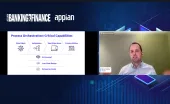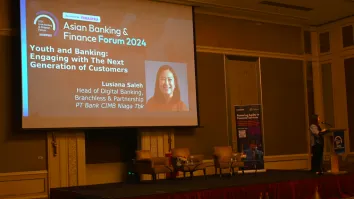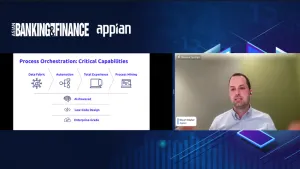
Data and automation will help Hong Kong banks survive until the next decade
Emerging technology and customer data will help banks weather low interest rates and new competition.
Amidst a time of muted loan growth, rising competition and recent business disruptions, 2020 has become more crucial for Hong Kong’s banking institutions to focus on cost and operational efficiency, improve credit processes, and leverage data to maintain competitiveness, according to a report by KPMG China.
The banking industry is expected to report muted financial results driven by the ongoing market uncertainty around US/China trade disputes as well as the low interest rate environment. Recent events and business disruption in Hong Kong have also impacted retail investor confidence, said Paul McSheaffrey, Partner, Head of Banking & Capital Markets, Hong Kong at KPMG China.
With margins continually squeezed and global macroeconomic uncertainty set to carry over into 2020, shifting to automation, improving competitiveness, and introducing more personalised products will be the deciding factor for the survival of Hong Kong’s banks not just through the year but until the next decade.
Invest to save
Whilst some banks may be tempted to make quick cuts to costs in order to ease pressures on their margins, the more successful banks are likely to realise that they need to invest more in order to save more in the longer term, according to Isabel Zisselsberger, Partner, Head of Customer & Industrial Markets, Hong Kong at KPMG China. Long-term savings will be these banks’ goal, and in order to achieve this, successful banks are likely to embrace emerging technologies, such as artificial intelligence (AI) and related digital solutions, and may even invest in fintech.
“These banks will work on more proofs of concept using complex technologies to generate greater returns and to solve labour-intensive and difficult processes—for example, the research-intensive parts of the onboarding process, or complex product due diligence procedures. Some will continue to invest in fintech to find innovative and cost-effective solutions to legacy problem,” said Zisselsberger.
Many banks will continue to explore the use of cloud technology to increase efficiency, but the complex regulatory requirements and security implications that come with implementing a cloud programme will remain a significant challenge. The city’s banks may also begin consolidating various automation projects scattered around their organisation to gain a comprehensive and strategic view of their automation programmes.
Banks are also expected to continue working on data projects that improve banks’ cost reporting. In particular, leaders will invest further in using data and different
sources of information in order to create more transparency around how costs are generated and allocated. Procurement teams will play greater roles in driving cost improvement through implementing more leading practices as well as utilising specialist cloud-enabled tools.
Financial institutions may also seek to partner with technology and consulting firms to build their own AI-enabled solutions. This option gives banks a new revenue stream and also presents them with a potentially-lucrative opportunity to tap into a solution that can provide long-term cost savings whilst generating return on investment.
Local banks will also continue to look at their overall organisational design to optimise their local and regional structure and footprint, added Zisselsberger.
Faster credit processing
Hong Kong banks enjoyed a credit boom in the previous years due to low interest rates. However, the slowing macroeconomic environment coupled with about US$4t in corporate bonds due to mature in the coming years meant that banks now face the threat of a rise in non-performing assets (NPAs) or even defaults.
As a result, credit risk is expected to rise in 2020, which would lead to the emergence of new ways of managing this risk. Key to this would be the development of faster and automated credit approval processes, said Michael Monteforte and Gemini Yang, Partner and Director of Financial Risk Management at KPMG China, respectively.
“There are currently varying levels of maturity amongst banks in Hong Kong in this space, and in 2020 the banks that adopt new technologies and integrate them into their credit origination processes to create a real-time credit approval engine will maintain a competitive advantage. 2020 may be the year where we see industry leaders start to apply machine learning models for credit approval,” noted Monteforte and Yang.
The development of automated credit approval engines will also give traditional banks an edge against the new virtual banks that are set to launch in Hong Kong in the next few months.
Chinese banks operating in Hong Kong will also join in the fray and seek to optimise their credit approval processes. However, unlike their peers operating in Hong Kong, the extent of their lending may be impacted by developments related to the Belt and Road initiative as well as the ongoing trade tensions, since most of these banks service Chinese corporates that are investing offshore.
Data is key to survival
Those that can leverage data to drive personalised outcomes will earn the right to survive, says Neil Macdonald, Head of Wealth & Asset Management Centre of Excellence at KPMG China.
“Creating a ‘seamless experience to achieve optimal customer outcomes’ is the grand ambition espoused by many banks. Hyperbole aside, what will industry leaders do in 2020 to improve the lives of their customers? Put simply, they will seek to use the vast swathes of data they have on our lives and our real, expressed preferences and nudge us, as individuals, towards improved financial health,” he noted.
By bringing past and present together, leveraging data analytics at scale, leading banks can predict the products and services customers will benefit most from. Banks can then encourage customers, using the skills of behavioural economists, to take a financial decision in a fiscally responsible way. Mis-selling could become a thing of the past as the algorithm becomes the new financial guardian.
“The recent rise of credible (and scalable) challenger and digital banks whose business models are centred around customer outcomes has sharpened the minds and loosened the wallets of senior banking teams around the globe. The proliferation of technologies that can free banks from the encumbrance of their legacy infrastructure and finally open up their customer data sets is making a reality of the ambition to offer more personalised products and services,” said Macdonald.
Banks that think they can win in this space but are concerned about their ability to deliver it using BAU technology management processes could create a ‘digital twin’ in 2020. The twin will be unhindered by the legacy processes that might otherwise delay/strangle the customer intimacy programme. This is an area where the virtual banks that are launching in Hong Kong have an edge over their traditional banking peers.
But what the virtual banks don’t have is a treasure trove of historical data locked up in traditional banks’ current systems.
This year may also see an increased focus on customer intimacy in the corporate market. For example, leading banks could use their knowledge of one corporate customer and link them with another, harnessing the information they have on the expressed preferences of both to drive a friction-free transaction.
“In an age where loyalty to financial services providers is declining—if indeed it ever existed beyond the gravitational pull of inertia—banks that are able to leverage the data they are sitting on to predict behaviour and create personalised experiences for their customers—personal and corporate—will give themselves a chance of long-term survival. Getting serious about achieving that in 2020 should be on the agenda of every bank that wants to still be in business in 2030,” said Macdonald. From KPMG’s Hong Kong Banking Outlook 2020
















 Advertise
Advertise






